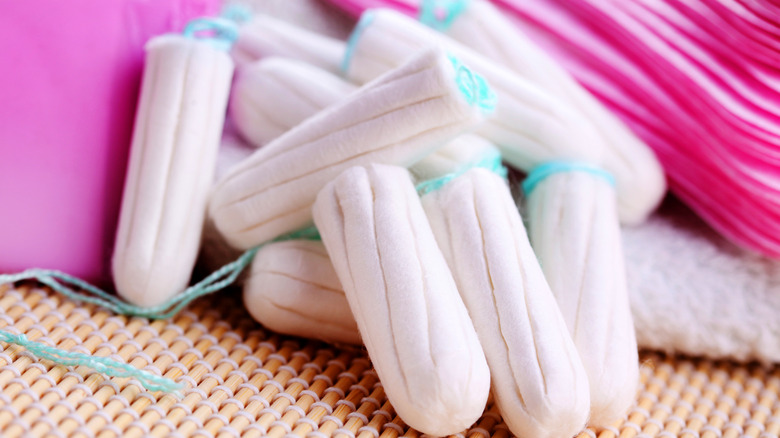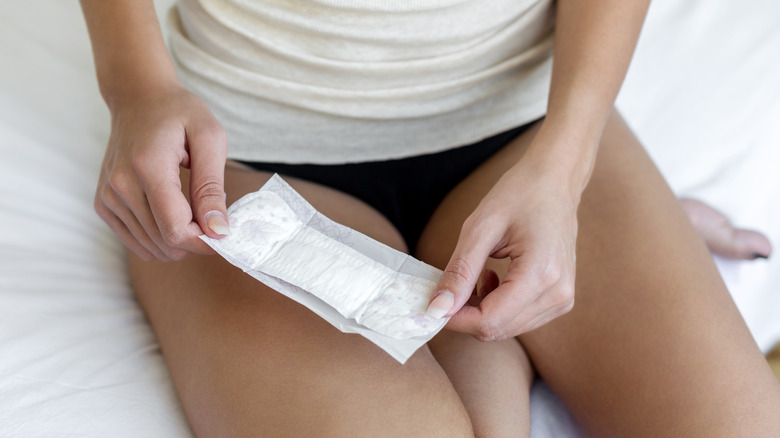Study Finds Arsenic And Lead In Tampons — How Nervous Should You Be?
In some fairly disconcerting news, a 2024 study published in Science Direct has found toxic metals in tampons. Researchers at the University of California, Berkeley evaluated 16 metal(loid)s, and of the 30 tampons that were studied — which included both organic and non-organic tampons, as well as various brands — every tampon that was examined contained detectable "concentrations of several toxic metals." Lead concentration was the highest in non-organic tampons, while organic tampons had the highest concentration of arsenic. According to the study, "no category had consistently lower concentrations of all or most metals." In other words, no matter what type of tampons you use, you're coming into contact with at least some level of toxicity.
"The finding of heavy metals such as lead and arsenic in tampons is alarming," board-certified obstetrician and gynecologist, Dr. Dawn Ericsson, exclusively told Women. "It is especially alarming that women reaching for products labeled as organic, to obtain a safe product, has as toxic a substance as the non-organic option."
While there are ways to get around using tampons, for example, there's the "free bleeding" movement and, of course, menstrual cups, what's a menstruating person who prefers tampons to do? Especially with the knowledge that even organic tampons aren't safe from these types of metals? To figure out exactly what this means and how potentially dangerous these metals can be, Women spoke to Dr. Dawn Ericsson to get her insight on the matter.
How this can be problematic for those who use tampons
As much as the words arsenic and lead can immediately instill fear because of their well-known toxicity, what amplifies the concern is that they're being found in tampons. As Dr. Ericsson explained, the vaginal lining can easily absorb them, meaning they'll end up in the bloodstream. "Women wear tampons for several hours to absorb the flow of menstrual blood over extended periods of time," said Dr. Ericsson. "The fact that tampons are worn for hours, intimate with tissue that has a mucous membrane, lends increased risk of absorption of substances from the tampon materials."
While the study found that the amount of these metals varied, even if only traces are detected in every tampon, that's still something that shouldn't be ignored. "Women wear tampons for up to eight hours at a time, for one week per month, for 35+ reproductive years, the accumulation of heavy metals could be great," said Dr. Ericsson. "Lead and arsenic in the human body can cause brain, nerve, hormonal, cardiovascular, liver, and kidney damage. This could lead to problems such as poor cognitive function, dementia, low energy, infertility, abnormal fetal development, gastrointestinal issues, diabetes, heart disease, cancer, and even death." It's also worth noting that even the study asserted that there's no "safe" exposure level to lead.
What you should do if you're concerned
According to the FDA, tampons are a Class II medical device, meaning brands are required to submit necessary information about their products and ingredients, but because of the classification, transparency isn't mandated. While private studies, like the one published in Science Direct this month, provide insight, we're still missing the whole picture.
"Consumers should request change in industry testing, regulation, and manufacture of such products," Dr. Ericsson exclusively told Women, while noting that the recent study is a step in the right direction and will hopefully encourage brands to take a closer look at their products. But even when companies are forced to take accountability, change takes a long time to happen — something consumers saw in the 1980s when toxic shock syndrome was linked to tampons. "It took over a decade to effect real change in the industry," said Dr. Ericsson. "Since that era, tampon manufacturers became bound by FDA protocol to implement 'Syngina' (synthetic vagina) testing for evaluating tampon absorbency ... This protocol could be amended to include the evaluation of absorbency of various tampon-containing substances by vaginal tissues."
Until we know exactly what's in tampons, Dr. Ericsson advises using alternative menstrual products, but doing so knowing they're all classified the same by the FDA. If you're genuinely concerned about your exposure to heavy metals, you can be tested. "Heavy metals in the body can be diminished using various methods," explained Dr. Ericsson. Granted, these aren't solutions to the problem.


